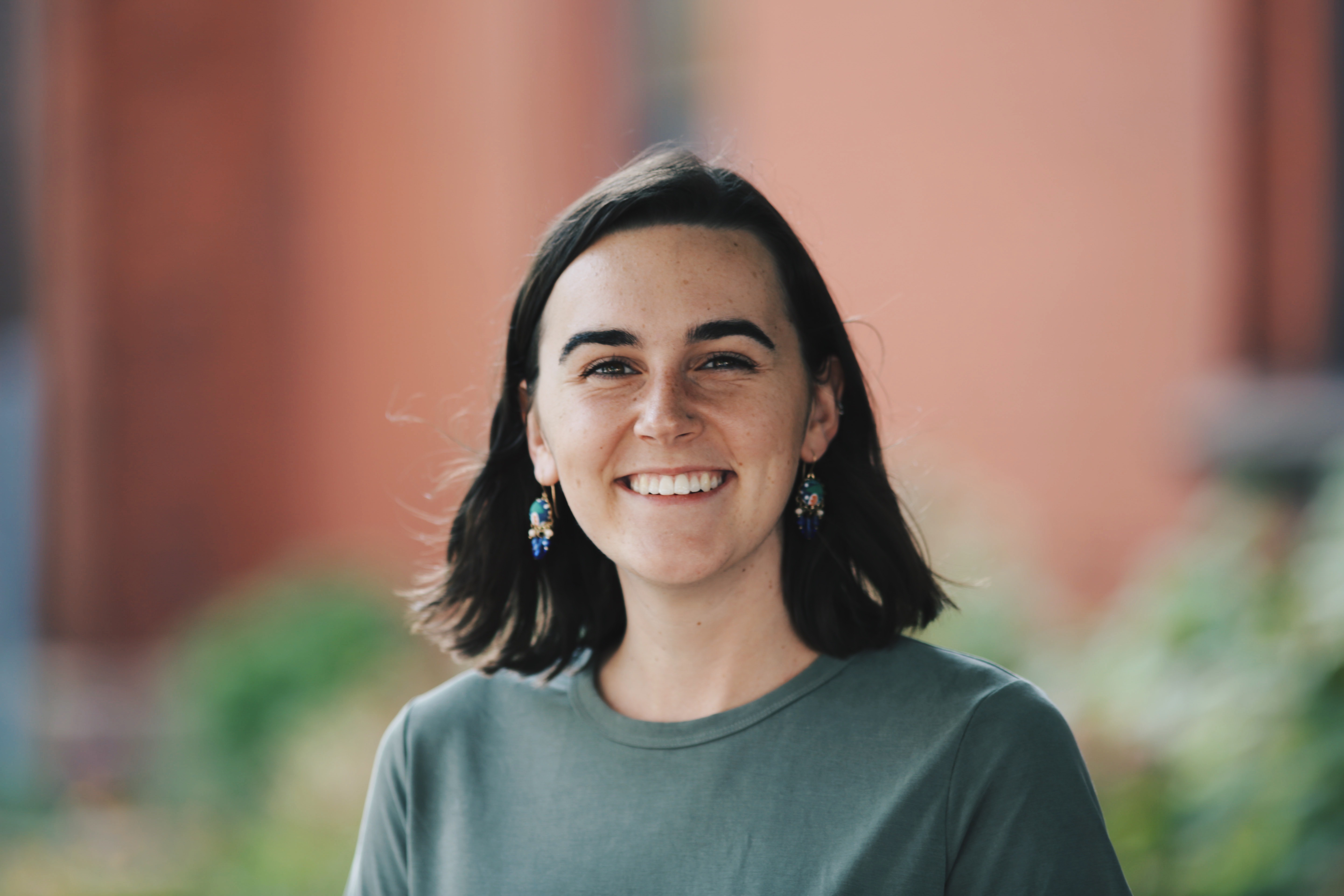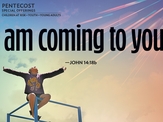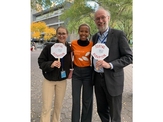Pentecost
Ministry at the intersection of faith, race and justice
As a student of social and health psychology at Presbyterian-related Davidson College, from which she graduated in 2019, Langley Hoyt knew her own mind best of all — not to mention her hands and feet.
It was those very feet that carried the lifelong Presbyterian beyond the college’s bucolic campus into the streets of West Charlotte, N.C., where the world’s injustices were all too apparent.
“For two summers during college, I worked and lived in a neighborhood in Charlotte where my neighbors, who were mostly Black and had low incomes, were very affected by systemic racism, over-policing and the housing crisis,” Hoyt said. “Because I wanted to keep engaging in these issues of justice while remaining deeply rooted both in faith and community, I was drawn after college to the Young Adult Volunteer program.”
The Young Adult Volunteer (YAV) program is an ecumenical, faith-based year of service for young people ages 19–30 in sites across the United States and around the world. YAVs accompany local agencies working to address the root causes of poverty and reconciliation while simultaneously exploring the meaning of their Christian faith and accountability to their neighbors in the community with peers and mentors. Not to be defeated by the COVID-19 pandemic, the YAV program has gone completely virtual for both national and international sites during the current 2020–21 program year.
Because of Hoyt’s two formative summer experiences interning at QC Family Tree — a nonprofit that advocates for affordable housing and does cultural organizing in the city of Charlotte, to which she returned to work in 2020 — she listed the PC(USA)’s Office of Public Witness (OPW) in Washington, D.C., along with other policy and/or housing-oriented placements among her preferences when applying to the YAV program.
“I knew these would be the kinds of programs that would continue to challenge me,” she said. “I wanted to go ‘upstream’ and figure out some more about the policies that affect the lives of people I care about.”

Hoyt, at the right, is photographed with, from left to right, Christian Brooks, U.S. Rep. Jamie Raskin of Maryland and the Rev. Jimmie Hawkins. (Photo courtesy of the Office of Public Witness)
Hoyt, who was ultimately placed as a YAV in the OPW, said that her year in Washington, D.C., really reinforced for her the importance of her faith as she continues to discern how she wants “to live and be in the world,” particularly in the light of the three focus areas of the PC(USA)’s Matthew 25 invitation to build congregational vitality, dismantle structural racism and eradicate systemic poverty.
According to Destini Hodges, interim coordinator for the YAV program, the three Matthew 25 focus areas have been at the heart of the YAV program since its inception nearly three decades ago.
“Because I am a lifelong Presbyterian, I have always valued the connectional nature of our church. But working at the national level for the last three years has made me appreciate those connections all the more, especially where the Matthew 25 invitation is concerned,” Hodges said. “The YAV program has been part of the Matthew 25 vision even before it became a vision of the whole church. Because the YAV program has been heavily focused on racial reconciliation and poverty for the past 27 years, to be able to see that play out on a broader scale — seeing how all of the pieces connect together — has been one of my greatest joys.”
In fact, it was the Matthew 25 invitation that guided much of Hoyt’s work during her year of service with the OPW.
“I worked on researching the Presbyterian Church’s legacy of white supremacy, particularly its participation in enslaving hundreds of thousands of African Americans,” she said. “I believe the church body still has much to do to face its complicity in white supremacy, anti-Blackness and taking some more risks to keep changing course.”
Because the OPW has a small staff, Hoyt’s dedication, flexibility and can-do attitude were a great asset.
“Langley was wonderful,” said Christian Brooks, representative for Domestic Issues in the OPW. “We are so grateful for all of the good work that she did. During our year together, Langley and I developed a great relationship. I saw my role as both her supervisor and mentor to help her develop skills and discern her next steps after the YAV program. It was amazing to watch her grow and walk with her through the process of gaining clarity on the path that she was being called to.”
Increasingly that path is leading Hoyt to seminary to pursue her M.Div. degree, with the goal of working for a more just world together alongside people who are commonly pushed to the margins of society.
“The spiritual formation practices we do in the YAV program really helped me to process my sense of calling and my openness to various future paths that I could take with an M.Div.,” said Hoyt. “Throughout the year, I continued to see more clearly how my faith and my God relentlessly call each of us to work for justice and healing in all areas of our lives. For me personally, I could not work for justice without remaining grounded in a faith whose God brings the mighty down from their thrones, exalts the lowly and fills the hungry with good things, just as we hear in Mary’s Magnificat.”
YAVs and aspiring ministers like Hoyt are supported, in part, through the Pentecost Offering, one of the PC(USA)’s four Special Offerings. Not only do gifts to the Pentecost Offering benefit the YAV program, but the offering also supports the Youth Triennium and the “Educate a Child, Transform the World” national initiative.
Although the Pentecost Offering may be taken anytime, most congregations receive it on Pentecost Sunday, which this year falls on May 23.
A hallmark of this shared offering is that 40% of it is retained by individual congregations for local ministries, while the remaining 60% is used to support children-at-risk, youth and young adults through ministries of the Presbyterian Mission Agency.
“It’s very important for Presbyterians to give to the Pentecost Offering because of its focus on Christian formation of youth,” said Hodges. “If we do not engage youth at an early age, they will get their formation somewhere else. Not only does the Pentecost Offering benefit the YAV program for ages 19–30 but other youth as well at ages where they are impressionable and need to have strong Christian leadership and formation in their lives.”
Echoing Hodges’s words, Hoyt — cognizant of her own privilege — also encourages Presbyterians to support the Pentecost Offering so that programs like YAV are able to assist every young adult who wishes to participate.
“Although this is not always the case, white churches often have disproportionately more wealth than Black or Indigenous churches in the PC(USA),” said Hoyt. “It is essential that this not mean that only young adults from wealthier white churches feel as though they can afford to do YAV. I know Presbyterians are so energized by the young adults who do YAV and are so committed to the life of this wonderful church. Because that is the case, we must continue to support the Pentecost Offering and ensure that young people from all backgrounds are fully and equitably supported.”
Give to the Pentecost Offering to continue the valuable work of the Young Adult Volunteer Program.
This was published for Presbyterian News Service on May 4, 2021.
read more stories:
participate with us
When we all do a little,
it adds up to a lot.
By giving to the Pentecost Offering, your congregation participates in helping our children, youth, and young adults grow up to proclaim with the Psalmist, "O God, from my youth you have taught me, and I still proclaim your wondrous deeds."







